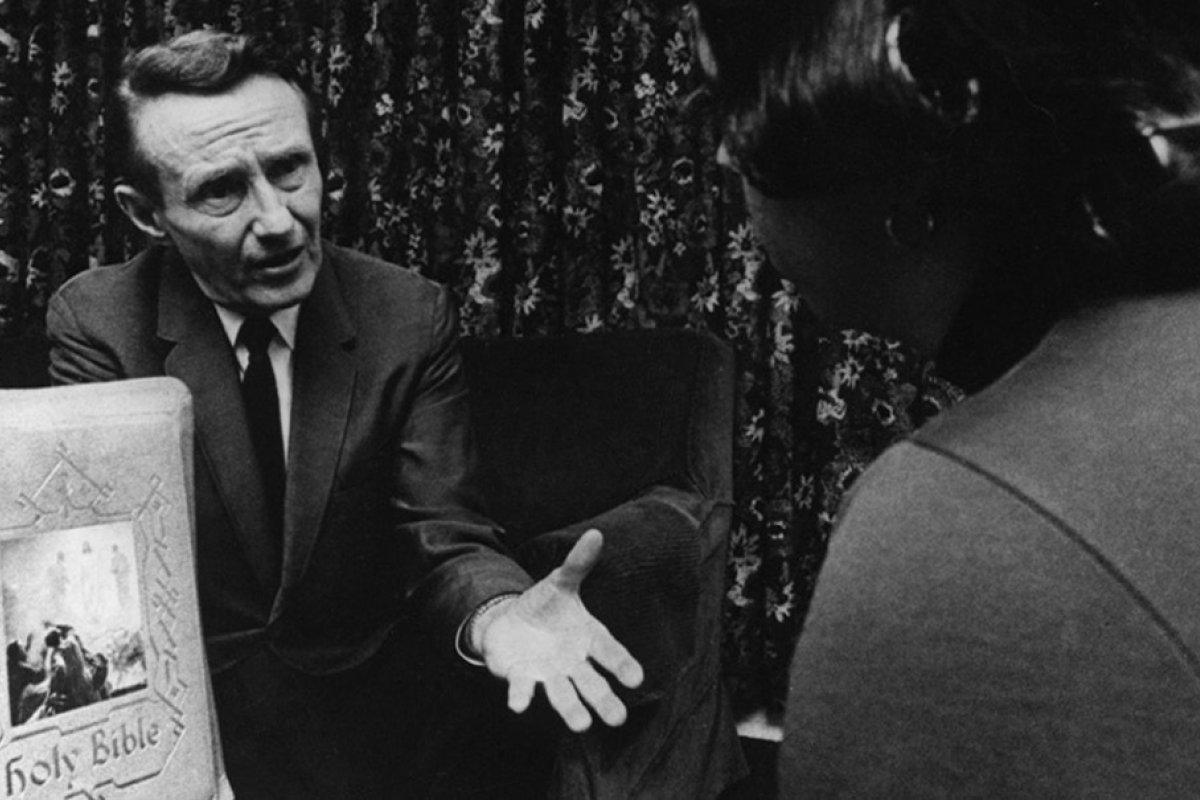
Selling the Gospel of Positive Thinking
It's the everyday nature of the failures in "Salesman," a film about Bible salesmen, that makes the film so powerful and relatable.
The salesman is an American icon—and not in a good way. American culture is filled with salesmen, almost every one of them a loser, a creep, or some combination of the two. Think of the sweaty, foul-mouthed failures of Glengarry Glen Ross. Or Gil Gunderson, the wheedling salesman of The Simpsons. Or the most iconic of them all, Willy Loman, who has lived out his heartbreaks over and over again in countless productions of Death of a Salesman.
The title figures of Salesman, the classic 1969 documentary directed by Albert and David Maysles and Charlotte Zwerin, are not as theatrically pathetic as their fictional counterparts. There’s neither sturm nor drang in this film. The omnipresent camera of Albert Maysles follows four Irish-American salesmen as they go door-to-door in Massachusetts and Florida, trying to sell expensive Bibles to working-class Catholics. We watch as Paul Brennan, the salesman with the most screen time, grows increasingly frustrated with his inability to close a sale. Nothing else happens and nothing much changes.
So why does Salesman regularly bring viewers (including me) to tears? Why does this movie, so clearly a product of a vanished world, a world populated by chain-smoking men with nicknames like “The Gipper” and “The Rabbit,” reach across the decades to touch us in the present? Why do viewers—including those at a special screening held in Chicago this week—continue to connect with these salesmen?
I think it’s because Salesman is about failure. Failure is never an exhausted topic, because we never stop failing—every day, at every thing, in countless ways. Indeed, it’s the everyday nature of the failures in Salesman which makes the film so powerful and relatable. We might not fail like Willy Loman, our life in ruins, our family strangers to us. But we certainly fail like Paul Brennan: trying to do a job that we have to do, yet feeling overmatched by the task itself and overwhelmed by a million small frustrations besides.
What elevates Salesman from a sad story into a tragedy is the nature of Paul’s work. He and his coworkers might be selling Catholic Bibles, but the religion which matters in Salesman is not Catholicism but positive thinking: the notion that you can achieve anything with a cheery disposition and optimistic mindset. As Paul tells the camera: “In this life, if you have a desire for anything, you’ll get it.” This was the gospel once preached by Norman Vincent Peale, the minister whose best-selling The Power of Positive Thinking (1952) begins with the command: “Believe in yourself! Believe in your abilities!” And it’s the gospel now embodied by Joel Osteen, pastor of America’s largest church, who encourages his tens of thousands of congregants to chant “I’m getting better and better every day!”
Lured on by the promise of success, Paul flattens his identity into a brand; his Catholic faith and Irish-American identity become nothing more than sales tactics. “Most of the people that I do place [Bibles] with are Irish people, because they’re very devout Catholics,” he tells one potential customer who he thinks (wrongly, it turns out) is also an Irish-American Catholic.
Yet as the film goes on, and as Paul knocks on door after door without success, the shadow side of positive thinking begins to swallow up his sunny optimism. Paul's manager puts this darkness into words, exhorting the salesmen: “If a guy’s not a success, he has no one to blame but himself.” If you can achieve anything you desire, then your failure is nobody’s fault but yours. Even the filmmakers can’t help taking this perspective. In his commentary on the film, Albert Maysles remarks: “There’s something in Paul that welcomes failure.”
It’s a cruel assessment, but it rings true. Salesmen are selling themselves as much as their products, and so their work demands a relentless positivity. Salesmen for DuPont in the 1920s were warned: “You are not dressed for work until you put on a smile.” Dale Carnegie used his experience as a door-to-door salesman to write the self-help classic How to Win Friends and Influence People (1936), which advised readers that a warm smile “will bring a good price in the marketplace.” Paul can’t put on this front. With potential clients, he lives up to his nickname “The Badger,” giving a sales pitch that seems more about pestering the customer than persuading them. On the director’s commentary, Charlotte Zwerin watches Paul at work and sighs: “The thing he’s not doing is putting on any charm, at all.” When he’s with his fellow salesmen, he lapses into silence, staring blankly into the distance as cigarette smoke curls around his face.
It’s that look, the face exhausted by the fixed smile, which resonates today. Social media has made us all salespeople. We all manage our image, real and digital, as we sell our “brand.” And that’s why Paul’s failure affects us (or at least affects me) so deeply. It’s not because he can’t sell Bibles. It’s because he’s trapped in a culture which equates smiling with success and condemns those who can’t accomplish either.
Salesman played this week at the University of Chicago’s Doc Films as part of a series on “False Preachers.” The salesmen aren’t above a little fraud to sell their product—at one point, Paul pretends to be a district manager in hopes of making a sale—but that’s not what makes them “false preachers.” Their falsehood is the smile which promises a happiness that never existed.


